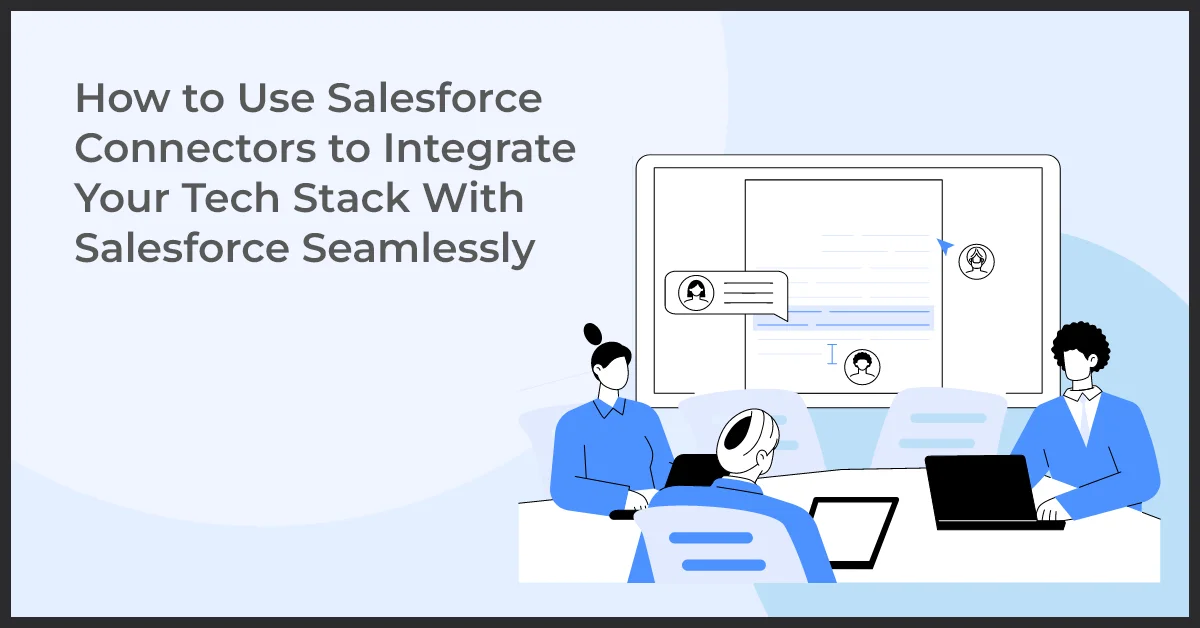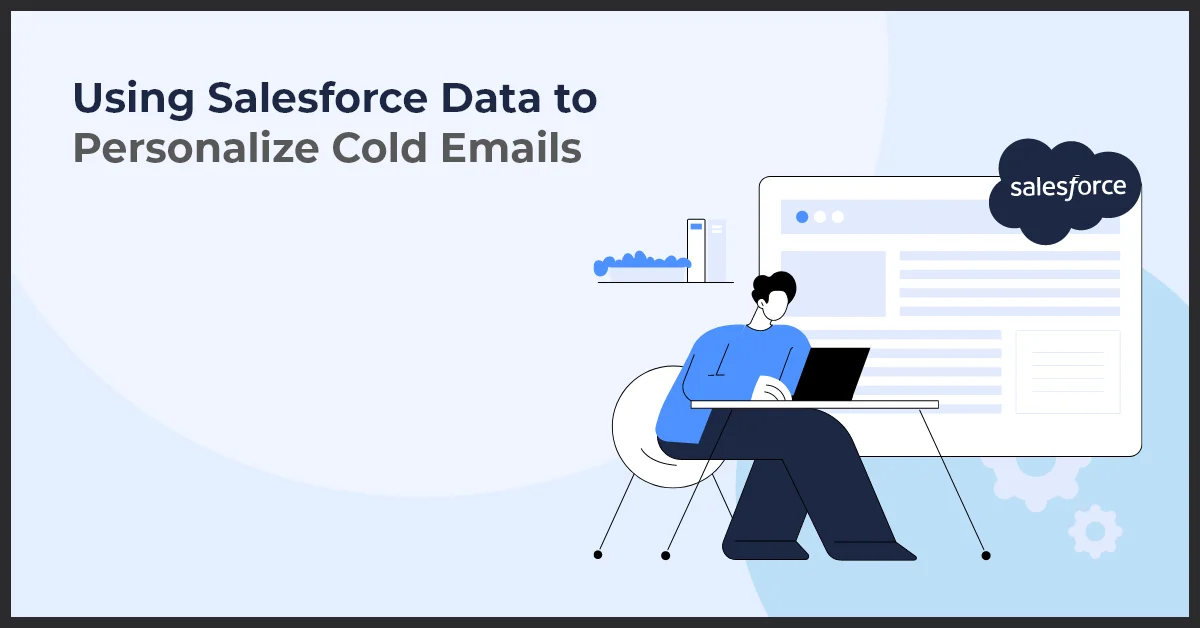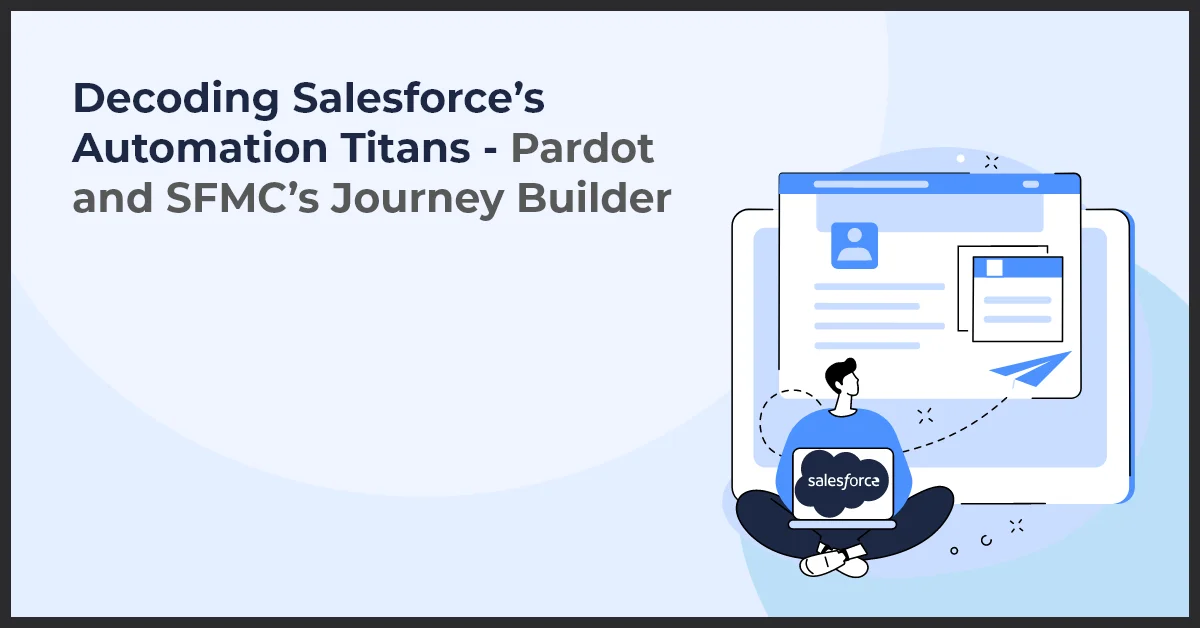How to Use Salesforce Connectors to Integrate Your Tech Stack With Salesforce Seamlessly

Published on: October 19, 2023
Updated on: April 09, 2024
593 Views
- Salesforce
12 min read
Salesforce connectors enable businesses to integrate their tech stack seamlessly with the Salesforce CRM platform. The present-day marketplace requires efficient and centralized customer data management, which is crucial for success.
Salesforce connectors offer a comprehensive solution by allowing businesses to synchronize, exchange, and update data between their tech stacks and Salesforce in real-time. By bridging the gap between systems, businesses can enjoy a unified view of customer interactions, optimize sales processes, and drive business growth.
By using Salesforce connectors, you can unlock numerous benefits.
- Firstly, it eliminates manual data entry and reduces the risk of errors and duplications, saving valuable time and resources.
- Secondly, it enhances data accuracy and consistency, ensuring that your teams can always access up-to-date and reliable customer information.
- Moreover, Salesforce connectors boost collaboration and knowledge sharing across departments, providing a holistic view of customer interactions and allowing for better strategizing and decision-making.
Whether a small business or a large enterprise, using Salesforce connectors can significantly propel your sales and customer service efforts. Stay ahead of the competition and use this powerful tool to maximize your CRM potential and drive business success.
Understanding Salesforce
Salesforce is a leading CRM platform that offers a range of features and functionality to help businesses manage their customer relationships effectively. As a CRM (Customer Relationship Management) platform, Salesforce provides tools and solutions to streamline and optimize various sales, marketing, and customer service aspects.
Features of Salesforce as a CRM Platform
Salesforce is a cloud-based CRM platform that enables organizations to store and manage customer data, track sales opportunities, and build stronger customer relationships. It offers a comprehensive suite of applications and functionalities to meet the diverse needs of businesses across various industries.
Some key features of Salesforce as a CRM platform include:
- Centralized Customer Database: Salesforce allows businesses to store all customer-related information in a centralized database. This has contact details, communication history, purchase history, and more.
- Salesforce Automation: With Salesforce, businesses can automate sales-related tasks such as lead capturing, opportunity management, and sales forecasting. This helps streamline the sales process and improves overall efficiency.
- Marketing Automation: Salesforce provides tools for marketing automation, allowing businesses to design and execute targeted marketing campaigns, track campaign performance, and analyze customer behavior.
- Customer Service Management: Salesforce offers functionalities to manage customer service processes, including case management, ticketing systems, and knowledge base management. This helps businesses provide prompt and efficient customer support.
- Analytics and Reporting: Salesforce enables businesses to gain insights into their sales, marketing, and customer service performance through comprehensive analytics and reporting features. This data-driven approach helps in making informed business decisions.
Benefits of Using Salesforce for Customer Relationship Management
There are several benefits of using Salesforce for customer relationship management:
- Improved Efficiency: Salesforce automates repetitive tasks, saving time and effort for sales and marketing professionals. This allows them to focus on more strategic activities.
- Enhanced Collaboration: Salesforce provides a centralized platform for teams to collaborate and share information, improving communication and teamwork.
- Better Customer Insights: By capturing and organizing customer data in Salesforce, businesses can gain valuable insights into customer preferences, behavior, and needs. This helps personalize interactions and offers a superior customer experience.
- Scalability and Flexibility: Salesforce is highly scalable, meaning it can accommodate the growth of businesses. It also provides a range of customizable features and integrations, allowing businesses to tailor the platform according to their specific requirements.
Role of Salesforce in Data Management and Analytics
Salesforce plays a crucial role in data management and analytics for businesses. It enables organizations to collect, store, and analyze vast customer data, providing actionable insights to drive business growth.
By leveraging Salesforce's analytics and reporting capabilities, businesses can:
- Understand customer buying patterns and trends.
- Identify sales opportunities and potential upsell/cross-sell opportunities.
- Track marketing campaign performance and ROI.
- Monitor customer service metrics and identify areas for improvement.
- Make data-driven decisions to optimize business strategies and operations.
What are Salesforce Connectors?
A Salesforce connector is a software tool that enables seamless integration and data synchronization between Salesforce and other systems or applications. It acts as a bridge between Salesforce and external platforms, facilitating the exchange of information and ensuring that data is up-to-date across all integrated systems.
The primary purpose of a Salesforce connector is to provide smooth and efficient communication between Salesforce and other applications, allowing businesses to streamline their processes and improve overall efficiency. By integrating Salesforce with other systems, organizations can centralize their data, automate workflows, and gain valuable insights into their sales and customer interactions.
One of the critical functionalities of a Salesforce connector is its ability to facilitate data synchronization and integration. It ensures that data entered or updated in one system is automatically reflected in Salesforce and vice versa. This eliminates the need for manual data entry and reduces the risk of errors or discrepancies in the data.
Moreover, Salesforce connectors play a critical role in enabling API integration. It provides developers the tools and resources to connect Salesforce with other systems through APIs (Application Programming Interfaces).
This opens up endless possibilities for businesses to integrate their CRM data with various third-party applications, such as marketing automation platforms, customer support tools, and e-commerce systems.
Key Features of a Salesforce Connector
Salesforce connectors offer several key features that can significantly enhance the functionality and efficiency of your Salesforce platform.
Data Management
- Seamless data synchronization between Salesforce and other systems: With a Salesforce connector, you can easily integrate and synchronize data between Salesforce and other systems, ensuring that all relevant information is up-to-date and readily available.
- Centralized handling and organization of customer data: Salesforce connectors enable the centralization of customer data, making it easier to manage and access information and improving customer service and decision-making.
- Role of a Salesforce connector in managing customer data integration: By providing robust data integration capabilities, Salesforce connectors enable seamless data integration from various sources, allowing for better insights and analysis.
Workflow Automation
- Automating business processes and tasks through Salesforce connectors: Salesforce connectors offer powerful workflow automation capabilities, enabling the automation of repetitive tasks and business processes and freeing up time and resources for more critical tasks.
- Benefits of workflow automation in streamlining operations: Workflow automation streamlines operations, reduces errors, and improves overall efficiency, allowing businesses to stay competitive and agile.
- Enhancing efficiency and productivity with Salesforce connector's workflow automation capabilities: By automating workflows, the Salesforce connectors boost efficiency and productivity, allowing teams to focus on strategic initiatives rather than administrative tasks.
Business Automation
- Overview of business automation and its significance: Business automation involves using technology to streamline and optimize business processes, enhancing productivity and reducing costs.
- How Salesforce connectors enable business automation in different areas: The Salesforce connectors play a critical role in business automation by integrating with various systems and enabling automation in areas such as sales, marketing, and customer service.
- Examples of processes that can be automated using Salesforce connectors: Some examples of processes that can be automated using a Salesforce connector include lead routing, email marketing campaigns, and customer onboarding.
Third-Party Applications Integration
- Importance of integrating third-party applications with Salesforce: Many businesses rely on third-party applications to enhance their Salesforce capabilities and improve overall efficiency.
- Role of Salesforce connectors in facilitating third-party integration: Salesforce connectors act as a bridge between Salesforce and third-party applications, enabling seamless integration and data exchange.
- Examples of popular third-party applications compatible with Salesforce connectors: Some popular third-party applications that can be integrated with Salesforce connectors include MailChimp, Zendesk, and Microsoft Dynamics CRM.
User Authentication and Access Management
User authentication and access management are crucial in ensuring data security and integrity regarding the Salesforce connectors.
User Authentication Using Salesforce Connectors
User authentication verifies the identity of users attempting to access a system or application. In the context of the Salesforce connectors, this means validating the credentials of users who want to connect and interact with Salesforce and other integrated services.
By employing a robust user authentication mechanism, the Salesforce connectors ensure that only authorized individuals can access and manipulate data within the connected systems. This not only protects sensitive information but also maintains the trustworthiness of the entire Salesforce ecosystem.
How Salesforce Connectors Ensure Secure Access to Salesforce and Other Integrated Services
Salesforce connectors employ advanced encryption and secure protocols to establish a secure channel for communication between the connector and Salesforce and other connected services. This ensures that user data and credentials remain protected during transit.
Salesforce connectors support multi-factor authentication, which adds an extra layer of security by requiring users to provide additional information, such as a temporary code sent to their registered mobile devices or email addresses.
Salesforce connectors implement various measures, such as IP whitelisting and user-based permissions, to control and restrict access based on user roles and privileges. This enables organizations to define granular access controls, ensuring only authorized personnel can access specific data and perform designated actions within Salesforce and the connected services.
Importance of User Access Management for Data Security
User access management is crucial for maintaining data security and preventing unauthorized access or breaches. With the Salesforce connectors, organizations can efficiently manage user access by defining roles, permissions, and access levels based on their specific needs and security policies.
Organizations can effectively control and monitor user privileges by implementing a robust user access management strategy, reducing the risk of unauthorized data access, manipulation, or leakage. This is especially important when integrating Salesforce with external systems, as it ensures that sensitive data remains secure throughout the entire data exchange process.
Marketing Cloud OAuth 2 and Salesforce Connectors
OAuth 2 is an industry-standard protocol that allows third-party applications limited access to user data on a particular service without requiring users to divulge their credentials. It provides a secure and straightforward way for users to grant permissions to applications and services to access their data.
How Marketing Cloud OAuth 2 Is Utilized With Salesforce Connectors
Within the context of Salesforce connectors, Marketing Cloud OAuth 2 enables seamless integration between Marketing Cloud and Salesforce, empowering businesses to leverage the combined strengths of both platforms. The OAuth 2 authentication protocol facilitates a secure and reliable connection between the two systems.
Benefits Of Using Marketing Cloud Oauth 2 In Conjunction With Salesforce Connectors
- Enhanced Security: Marketing Cloud OAuth 2 ensures that only authorized users can access sensitive data, reducing the risk of unauthorized access or data breaches.
- Streamlined Integration: By utilizing Marketing Cloud OAuth 2 with Salesforce connectors, businesses can seamlessly exchange data between Marketing Cloud and Salesforce, eliminating the need for manual data transfer or duplicate data entry.
- Increased Efficiency: The combination of Marketing Cloud OAuth 2 and Salesforce connectors allows for automated synchronization of customer data, ensuring that both platforms are always up-to-date and accurate. This streamlines marketing and sales processes, enabling businesses to effectively deliver targeted and personalized campaigns.
- Improved Customer Insights: Marketing Cloud OAuth 2 and Salesforce connectors allow access to comprehensive customer data from both platforms, providing businesses with a holistic view of their customers. This valuable insight can drive personalized marketing initiatives and targeted sales strategies.
- Seamless Collaboration: Marketing and sales teams can work seamlessly together by utilizing Marketing Cloud OAuth 2 with Salesforce connectors. They can share crucial customer information, track interactions, and collaborate effectively, enhancing customer experiences and increasing sales opportunities.
Cloud-based Platforms and Salesforce connectors
Cloud-based platforms have become increasingly popular due to their numerous advantages. These platforms allow businesses to access and store data and applications over the internet, eliminating the need for costly on-premise infrastructure.
One of the key advantages of cloud-based platforms is their scalability. With traditional on-premise systems, businesses often need help adding resources or expanding their operations.
However, with a cloud-based platform, businesses can quickly scale their resources up or down as needed, allowing for seamless growth and flexibility.
Another advantage of cloud-based platforms is their cost-effectiveness. These platforms eliminate the need for businesses to invest in expensive hardware and infrastructure, as everything is hosted and maintained by the cloud provider. This reduces upfront costs and allows businesses to pay for what they use, making it an affordable solution for organizations of all sizes.
Salesforce connectors take full advantage of cloud technologies to provide businesses with seamless integration between their Salesforce instance and other applications or systems. By leveraging the power of the cloud, the Salesforce connectors enable real-time data synchronization, ensuring that businesses have access to up-to-date information at all times.
Furthermore, the cloud-based nature of the Salesforce connectors allows for easy and simplified deployment. Businesses can quickly and effortlessly connect their Salesforce instance with other cloud-based applications, eliminating the need for complex and time-consuming integration processes.
Using cloud-based Salesforce connectors offers numerous benefits for businesses. Firstly, it enhances operational efficiency by automating processes and reducing manual intervention. This saves time, minimizes the risk of errors, and ensures accurate and consistent data across all systems.
Additionally, cloud-based Salesforce connectors improve collaboration and communication between different departments and teams. With real-time data synchronization, all stakeholders can access the most up-to-date information, enabling better decision-making and streamlined workflows.
Conclusion
Integrating Salesforce connectors into your business infrastructure is an investment that yields numerous benefits. From streamlining CRM to enhancing data management, these powerful tools empower your organization to make data-driven decisions and deliver exceptional customer experiences. Take advantage of the opportunity to revolutionize your sales processes and improve your business. To learn more about leveraging and integrating Salesforce connectors for your business, contact experts at Growth Natives. Our team offers the expertise you need to develop and implement reliable Salesforce solutions. Partner with us today and get your extended Salesforce team to work with you. Email us at info@growthnatives.com today to learn more about our services.



